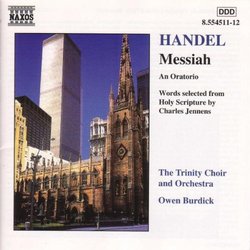| All Artists: George Frederick Handel, Owen Burdick, Trinity Orchestra, Bethany Hodges, Janine Ullyette, Rebekah Wilshire, Benjamin Brecher Title: Handel: Messiah Members Wishing: 0 Total Copies: 0 Label: Naxos Original Release Date: 1/1/1999 Re-Release Date: 11/30/1999 Genres: Special Interest, Classical Styles: Holiday & Wedding, Opera & Classical Vocal, Historical Periods, Baroque (c.1600-1750) Number of Discs: 2 SwapaCD Credits: 2 UPC: 636943451120 |
Search - George Frederick Handel, Owen Burdick, Trinity Orchestra :: Handel: Messiah
 | George Frederick Handel, Owen Burdick, Trinity Orchestra Handel: Messiah Genres: Special Interest, Classical
|
Larger Image |
CD Details |
CD ReviewsAn historical perspective, especially for New Yorkers L. Lubin | NY, NY | 12/07/2008 (5 out of 5 stars) "As mentioned above, this recording was made in Trinity Church on Wall Street, New York, where The Messiah had its North American premiere in 1770. But that is not the only matter of historical significance to be noted here. This recording was made in 1999, released in time for Easter, when I first heard it previewed on the radio with an interview with the conductor, Dr. Owen Burdick. (Owen was a classmate of mine at SUNY Purchase, where he kept a harpsichord under his bed in what had been my room the previous year. But that was a long time ago.) I have seen Owen several times since, and I have sung operas at Trinity and its sister, St. Paul's Chapel. I was struck by the clarity of the small group of young choristers and the precision of diction, as well as the rightness of the tempi; I resolved to buy a copy as soon as possible an did so. One and a half years later occurred the horrendous tragedy of the 9/11 attacks on the World Trade Center, only a few blocks away from Trinity Church. (The Twin Towers appear behind the church on the cover photograph.) While it became impossible to clear the dust and debris from Trinity's organ, Owen and his choristers, from which the soloists are drawn, were still able to arrange a performance with orchestra and a portable organ, which was broadcast on WQXR radio. That performance, freighted as it was with such profound emotional weight, was the greatest experience of this oratorio I have ever had. I stood on the edge of the mighty Palisades, looking downstream at where the towers had stood, when the sudden crash of the tympani began the final Amen Chorus, and tears flowed from my eyes. I could clearly see the tongues of flame dance above the musicians heads in my mind. Trinity's annual Messiah broadcasts have become a New York tradition. This recording is not so emotionally fraught, but is still an exceptional souvenir, one of four Messiah recordings I cherish; Gardiner's and Marriner's (the later London version), and even Brrcham's being the other three. There are other particular New York touches: for example,the alto aria "But who may abide" is given to the bass as it was here in 1770, not the alternate bass aria from Handel's London version. As stated above, there is no definitive performance of The Messiah, just as there is no definitive performing version. But Dr. Burdick's choices are musically sound, his artists are fresh and fervent, and their collective passion is evident. This is a fine addition to any collection, not only as an only or additional recording of a masterpiece, but as a testament to the history of the Greatest City in the World, before history changed us forever." Pure C. C. Cynova | Albuquerque, NM United States | 11/27/2007 (5 out of 5 stars) "I do not pretend to be any sort of an expert when it comes to the different CD versions of Messiah. I have many of them, because I enjoy the music.
There is something about this CD though. A purity of notes. An unaffected singing. Whatever it is, I have enjoyed listening, very very much. It is as if the music is all new again. I am delighted." |

 Track Listings (26) - Disc #1
Track Listings (26) - Disc #1